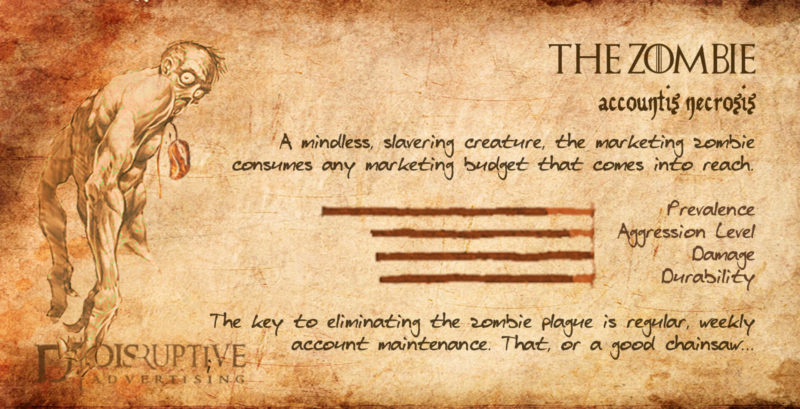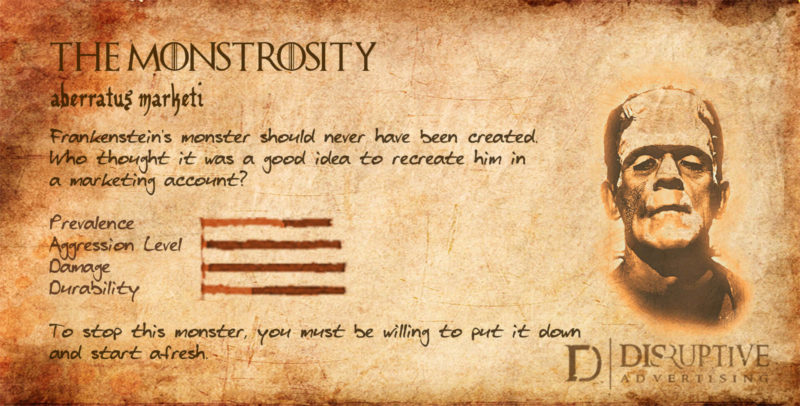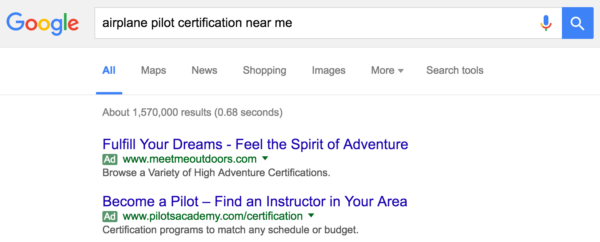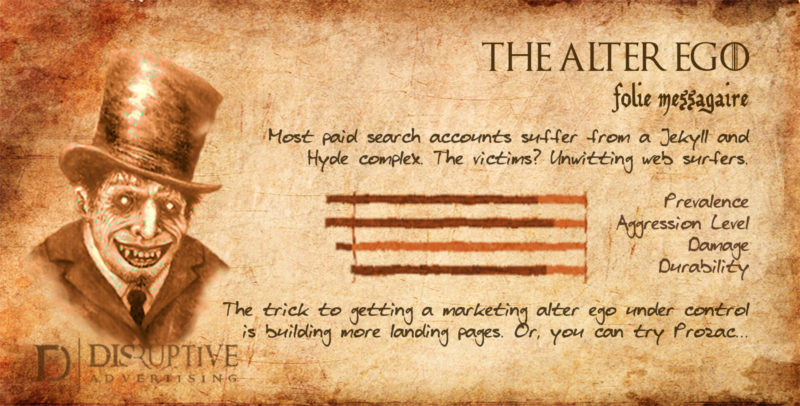Are there PPC monsters lurking inside your paid search account?
Are your paid search campaigns looking a bit scary? Columnist Jacob Baadsgaard describes how to vanquish the monsters that may be wreaking havoc on your accounts and impacting PPC performance.

Have you ever opened up a paid search report and felt a jolt of fear?
Maybe your new campaign wasn’t performing well. Maybe you’d inexplicably spent a ton on AdWords and had nothing to show for it. Maybe it was just more bad news in a losing fight for profitability.
Regardless of your particular situation, if you’ve been in paid search for long, you’ve probably had that gut-wrenching feeling at some point.
Turns out, there’s more to that feeling than you might have thought.
After a series of rather extraordinary events, it’s become clear to me that there is a reason why so many companies struggle with search engine marketing.
There be monsters out there…
Fighting the good fight
It seems like there are monster shows everywhere these days (The Walking Dead, True Blood, The Vampire Diaries, Supernatural, just to name a few). I’d always thought this was just a pop culture trend, but it turns out that there’s something to this fascination.
Though it might seem a bit far-fetched, we face these monsters on a daily basis, and we don’t even realize it. However, once you discover that you’re under attack, you can actually fight back.
Let’s take a look at some of the monsters that may be lurking in your PPC accounts:
The zombie
Thanks to The Walking Dead, we’re all very familiar with the idea of zombies. But has it ever occurred to you that you might be at war with the zombie plague right now?
When it comes to PPC advertising, there are a lot of account management zombies out there. They wander about mindlessly and seem to only be good for one thing: consuming marketing budgets.
In fact, according to Larry Kim, only one in every 10 PPC account managers consistently works on their accounts on a quarterly basis. That means 90 percent of paid search account managers are marketing zombies!
After auditing more than 2,000 AdWords accounts at Disruptive, we’ve found that 72 percent of accounts haven’t been touched in a month.
Fortunately, unlike the zombies depicted in the media, it turns out that there is a cure for the zombie plague: regular account maintenance.
Just like most plagues, the key to avoiding (or recovering from) a bout with the marketing zombie plague is regular sanitization. In other words, you need to clean up and optimize your accounts on a regular basis.
How often you need to “cleanse” your accounts is largely dependent on your traffic and budget. If you’re spending over $10,000 a month, your campaigns need to be reviewed thoroughly at least once a week. However, marketing zombies seem to be attracted to large marketing budgets, so this still may not be enough.
In this budget range, I personally recommend cleaning up your campaigns at least three times per week. And, if you’re starting a new campaign, you must be even more vigilant. In general, I’d check up on a new campaign at least three times a day.
With smaller budgets, you may not drive enough traffic to attract zombies, so a bimonthly or monthly checkup may be all you need to stave off the plague.
Now, all that being said, if you’ve spent a lot of time cleaning up your campaigns, they may be running fairly well. In this case, you may not need to make major changes three times a day or week, but you’ll still want to keep close tabs on your account to make sure you steer clear of this deadly affliction.
The monstrosity
Remember Frankenstein’s monster? The poor creature was stitched together from the remains of dozens of corpses and forced into a horrible semblance of life.
Frankenstein’s monster was the horrible creation of a madman, and his life was a sad tale of confusion, destruction and heartbreak.
Unfortunately, you see the exact same tale playing out in countless paid search accounts.
Instead of letting old, ineffective ads or keywords lie in peace, many marketers seem to have a strange urge to try and create new life from dead campaigns. They stitch together ads and keywords into new campaigns and then keep adding more marketing budget voltage until the monstrosity finally starts moving.
Unfortunately, while their monstrous creation might drive clicks and conversions, it’s nothing more than a poor imitation of a real marketing account.
Confused about their place in the world, these accounts lumber about wreaking havoc. Their keywords compete with each other, their ads baffle traffic and they destroy any hope of a return on investment.
But honestly, it’s not their fault.
These Frankenstein-ian marketing creations don’t know any better. They were assembled from the leavings of other campaigns in a vain hope of breathing new life into a paid search account. The fault lies with their creators.
Like Dr. Frankenstein, you may have a temptation to try and breathe life back into what once was good and beautiful in your paid search marketing. But the problem is, the world moves on. Markets change. Keywords evolve.
If you keep trying to force old campaigns to work in a new environment, you set them up to fail. To effectively market, you have to be willing to move on.
Fortunately, if you’ve turned your paid search account into a modern Frankenstein’s monster, there’s a simple solution: start over. There’s no harm in learning from the past, but it’s better to use what you learn from the past to create new campaigns than it is to try and stitch new ideas into old campaigns.
The alter ego
Before Bruce Banner and the Hulk, there was Jekyll and Hyde. Although these men seem mild-mannered on the surface, their calm conceals a darker, terribly destructive side.
Unfortunately, multiple personality disorder isn’t solely limited to philanthropic doctors. The majority of paid search accounts struggle with this problem, too.
Here’s what happens:
If you’re advertising your pilot training program and someone clicks on your ad (the second one), your ad is probably doing a great job of attracting the right traffic.
Dr. Jekyll is firmly in control, right?
They click on your ad, expecting to arrive on a page about learning to fly. Then, suddenly, your campaign’s alter ego kicks in, and Hyde takes over and shows them a landing page like this:
Horrified and confused, your “perfect customer” screams and hits the back button as quickly as possible.
Now, marketing alter egos are tricky. In this case, you might have been using dynamic keyword insertion on your landing page in the belief that it would improve your conversion rate. After all, if your headline matches the keyword that triggered your ad, people will be more likely to convert, right?
Unfortunately, that’s your marketing alter ego talking.
Just because you’ve made a few tweaks to your landing page or the content on your home page is somewhat relevant to your keyword, that doesn’t mean that your page is a match for your target audience’s expectations.
To overcome this monster, you have to be willing to put in enough time and effort to keep your marketing campaign’s darker side under control. In general, that means you need specific landing pages for every group of closely related keywords.
Does it take extra work to put together these landing pages? Sure, but it’s better than pulling a Jekyll and Hyde on your potential customers.
Conclusion
Sure, the PPC monsters in your paid search account might not look like the classic zombie, Frankenstein’s monster or Jekyll and Hyde, but they behave the same way. And, more importantly, they can deal just as much damage to your campaigns as their physical counterparts.
Like I said, there be monsters out there…
Contributing authors are invited to create content for Search Engine Land and are chosen for their expertise and contribution to the search community. Our contributors work under the oversight of the editorial staff and contributions are checked for quality and relevance to our readers. The opinions they express are their own.
Related stories





